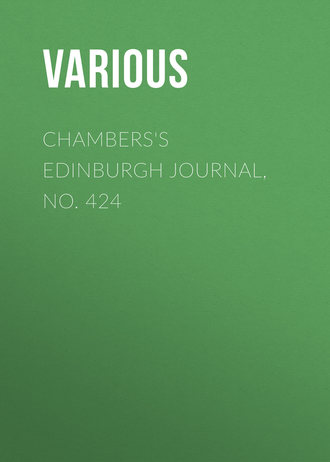
Various
Chambers's Edinburgh Journal, No. 424
ENGLISH PLOUGHING
The following, written from England, is going the round of the papers, and is as true as the gospel, in my opinion. I have seen better ploughing here with a pair of oxen than in the old country with five horses; but Johnny won't learn. 'Lord! only look at five great, elephant-looking beasts in one plough, with one great lummokin fellow to hold the handle, and another to carry the whip, and a boy to lead, whose boots have more iron on them than the horses' hoofs have, all crawling as if going to a funeral! What sort of a way is that to do work? It makes me mad to look at 'em. If there is any airthly clumsy fashion of doin' a thing, that's the way they are always sure to git here. They're a benighted, obstinate, bull-headed people the English, that's the fact, and always was.' Well done, Jonathan—quite true!—From a private Letter from Boston.
JOHN BUNYAN AND MINCE-PIES
In No. 417 of this Journal it is chronicled that John Bunyan scrupled to eat mince-pies, because of the superstitious character popularly attached to them; but it would appear from an anecdote sent to us by a correspondent, that if this was true at all of the author of the Pilgrim's Progress, he must have received new light upon the subject at a later period of life. When he was imprisoned for preaching—so says the anecdote—in Bedford jail, a superstitious lady, thinking to entrap him, sent a servant to request his acceptance of a Christmas pie; whereupon Banyan replied: 'Tell your mistress that I accept her present thankfully, for I have learned to distinguish between a mince-pie and superstition.'
FOREST-TEACHINGS
There was travelling in the wild-wood
Once, a child of song;
And he marked the forest-monarchs
As he went along.
Here, the oak, broad-eaved and spreading;
Here, the poplar tall;
Here, the holly, forky-leaved;
Here, the yew, for the bereaved;
Here, the chestnut, with its flowers, and its spine-bestudded ball.
Here, the cedar, palmy-branchèd;
Here, the hazel low;
Here, the aspen, quivering ever;
Here, the powdered sloe.
Wondrous was their form and fashion,
Passing beautiful to see
How the branches interlaced,
How the leaves each other chased,
Fluttering lightly hither, thither on the wind-arousèd tree.
Then he spake to those wood-dwellers:
'Ye are like to men,
And I learn a lesson from ye
With my spirit's ken.
Like to us in low beginning,
Children of the patient earth;
Born, like us, to rise on high,
Ever nearer to the sky,
And, like us, by slow advances from the minute of your birth.
'And, like mortals, ye have uses—
Uses each his own:
Each his gift, and each his beauty,
Not to other known.
Thou, O oak, the strong ship-builder,
For thy country's good,
Givest up thy noble life,
Like a patriot in the strife,
Givest up thy heart of timber, as he poureth out his blood.
'Thou, O poplar, tall and taper,
Reachest up on high;
Like a preacher pointing upward—
Upward to the sky.
Thou, O holly, with thy berries,
Gleaming redly bright,
Comest, like a pleasant friend,
When the dying year hath end,
Comest to the Christmas party, round the ruddy fire-light.
'Thou, O yew, with sombre branches,
And dark-veilèd head—
Like a monk within the church-yard,
When the prayers are said,
Standing by the newly-buried
In the depth of thought—
Tellest, with a solemn grace,
Of the earthly dwelling-place,
Of the soul to live for ever—of the body come to nought,
'Thou, O cedar, storm-enduring,
Bent with years, and old,
Standest with thy broad-eaved branches,
Shadowing o'er the mould;
Shadowing o'er the tender saplings,
Like a patriarch mild,
When he lifts his hoary head,
And his hands a blessing shed,
On the little ones around him—on the children of his child.
'And the light, smooth-barkèd hazel,
And the dusky sloe,
Are the poor men of the forest—
Are the weak and low.
Yet unto the poor is given
Power the earth to bless;
And the sloe's small fruit of down,
And the hazel's clusters brown,
Are the tribute they can offer—are their mite of usefulness.
'When the awful words were spoken,
"It is finishèd!"—
When the all-loving heart was broken,
Bowed the patient head;
When the earth grew dark as midnight
In her solemn awe—
Then the forest-branches all
Bent, with reverential fall—
Bent, as bent the Jewish foreheads at the giving of the law.
'But one tree was in the forest
That refused to bow;
Then a sudden blast came o'er it,
And a whisper low
Made the leaves and branches quiver—
Shook the guilty tree;
And the voice was: "Tremble ever
To eternity:
Be a lesson from thee read—
He that boweth not his head,
And obeyeth not his Maker, let him fear eternally!"
'So thou standest ever shaking,
Ever quivering with fear,
For the voice is still upon thee,
And the whisper near.
Like the guilty, conscience-haunted;
And the name for thee
Is, "The tree of many thoughts"—
Is, "The tree of many doubts;"
And thy leaves are thoughts and doubtings—for thou art the sinner's tree.
'Thou, O chestnut, richly branched,
Standest in thy might,
Rising like a leafy tower
In the summer light.
And thy branches are fruit-laden,
Waving bold and free;
And the beams upon thee shed
Are like blessings on thy head:
Thou art strong, and fair, and fruitful—for thou art the good man's tree.
'So, farewell, great forest-teachers:
There is a spirit dwells
In the veinings of each leaflet,
In each flower's cells:
Ye have each a voice and lesson,
And ye seem to say:
"Open, man, thine eyes to see
In each flower, stone, and tree,
Something pure and something holy, as thou passest on thy way."'
F.C.W.


